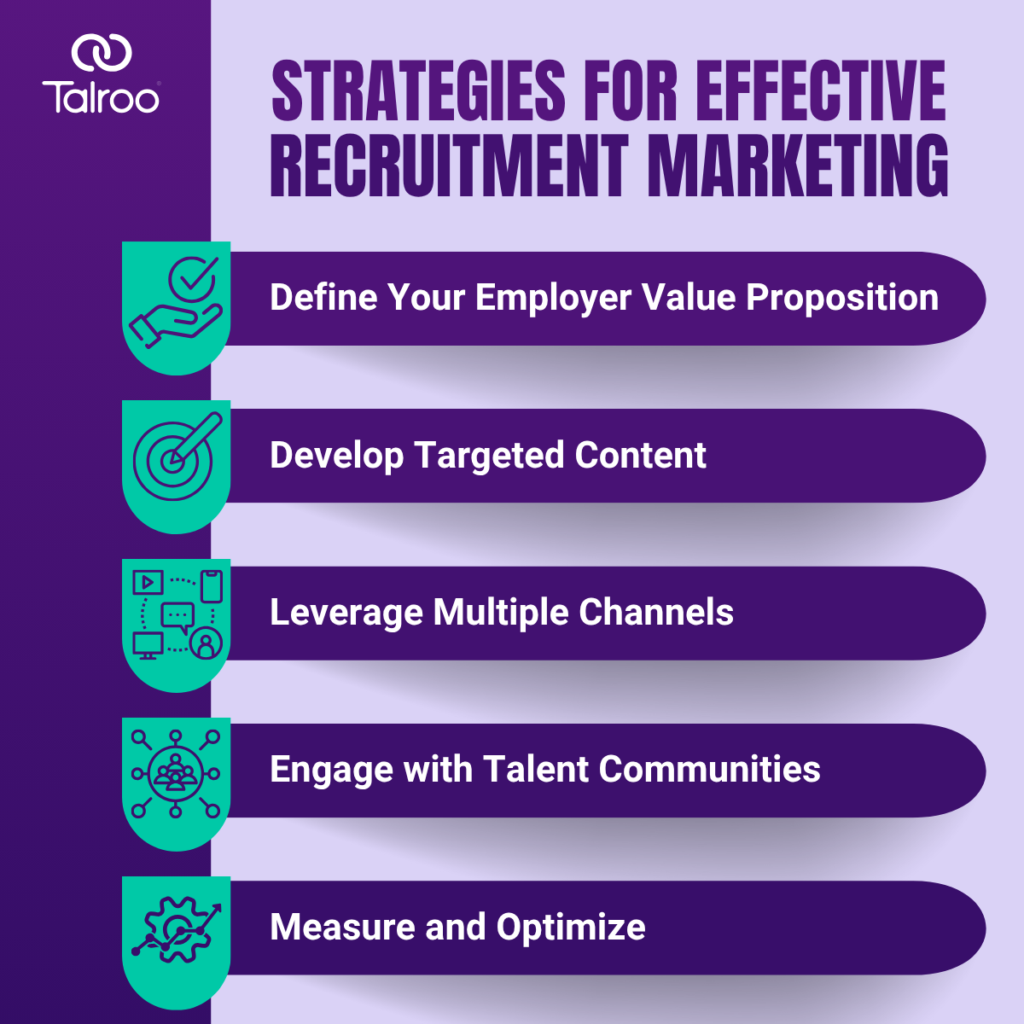
Ultimate Guide to Recruitment Marketing: Strategies for Attracting Top Talent
In today’s competitive job market, simply posting a job opening isn’t enough to attract top-tier candidates. With the rise of digital platforms and evolving candidate expectations, companies must adopt proactive strategies to stand out. This is where recruitment marketing comes into play.
What Is Recruitment Marketing?
Recruitment marketing involves applying marketing principles to the recruitment process. It’s about promoting your organization as an employer of choice to attract, engage, and nurture potential candidates—even before they consider applying. This approach focuses on building awareness and interest among passive candidates, guiding them through a journey that leads to application and, ultimately, hiring.
Related: On-Demand Webinar – Recruiting Marketing 101
Recruitment vs. Recruitment Marketing
While both recruitment and recruitment marketing aim to fill job vacancies, they differ in approach and timing. Here’s a quick breakdown of each:
- Recruitment: A reactive process that begins once a job opening arises. It involves sourcing, interviewing, and hiring candidates to fill specific roles.
- Recruitment Marketing: A proactive strategy that focuses on building a talent pipeline by promoting the company’s culture, values, and opportunities. It aims to attract potential candidates before a specific position becomes available.
By integrating recruitment marketing into your talent acquisition strategy, you can ensure a steady flow of qualified candidates ready to step into roles as they open.
Recruitment Marketing vs. Employer Branding
Though closely related, recruitment marketing and employer branding serve distinct purposes:
- Employer Branding: The process of defining and communicating your organization’s reputation as an employer. It encompasses your company’s mission, values, culture, and employee experiences.
- Recruitment Marketing: The tactical execution of promoting your employer brand to attract candidates. It includes targeted campaigns, content creation, and engagement strategies to showcase your company to potential hires.
In essence, employer branding establishes the foundation, while recruitment marketing builds upon it to reach and engage prospective candidates.
Related: The Role of Employer Branding in Recruitment Marketing
Why Recruitment Marketing Matters
Job seekers—especially top performers—approach their job search like savvy consumers. They research companies, compare cultures, read reviews, and weigh their options carefully before applying. As a result, employers must do more than post jobs; they need to actively promote what makes them unique. Recruitment marketing empowers organizations to connect with the right candidates in the right way—long before a resume is submitted.
In a landscape where top talent has numerous options, standing out is crucial if you want their consideration. Here’s why recruitment marketing is essential:
- Engaging Passive Candidates: Many qualified individuals aren’t actively job hunting. Recruitment marketing helps you reach and attract these passive candidates.
- Enhancing Candidate Experience: By providing valuable content and insights into your company culture, you create a positive impression that encourages applications.
- Building a Talent Pipeline: Proactively engaging with potential candidates ensures a ready pool of talent for future openings.
- Strengthening Employer Brand: Consistent messaging and storytelling reinforce your company’s reputation, making it more appealing to job seekers.
The Recruitment Marketing Funnel
The purpose of a recruitment marketing funnel is to strategically guide potential candidates through a journey—from first becoming aware of your company to ultimately applying for a job. It helps organizations attract, engage, and nurture talent over time, especially passive candidates who aren’t actively job hunting.
Similar to a sales funnel, the recruitment marketing funnel guides candidates through stages:
- Awareness: Candidates discover your company through various channels like social media, job boards, or referrals.
- Consideration: They explore your company’s culture, values, and opportunities, assessing alignment with their career goals.
- Interest: Engaged candidates interact with your content, attend events, or subscribe to newsletters, indicating growing interest.
- Application: Motivated candidates apply for open positions, having been nurtured through the previous stages.
By understanding and optimizing each stage, you can effectively guide candidates from initial awareness to application.
Key Strategies for Effective Recruitment Marketing
To build a robust recruitment marketing strategy, consider the following steps:
- Define Your Employer Value Proposition (EVP): Clearly articulate what sets your company apart as an employer.
- Develop Targeted Content: Create blogs, videos, and testimonials that showcase your culture, mission, and employee experiences.
- Leverage Multiple Channels: Use social media, email campaigns, job boards, and career sites to reach diverse audiences.
- Engage with Talent Communities: Build relationships with potential candidates through events, webinars, and networking opportunities.
- Measure and Optimize: Track metrics like engagement rates, application conversions, and source effectiveness to refine your approach.

Related: 5 Recruitment Marketing Strategies to Fill Your Funnel Quickly
The Role of Recruitment Marketers
Recruitment marketers play a pivotal role in bridging the gap between marketing and HR. Their responsibilities include:
- Crafting Compelling Messaging: Developing narratives that resonate with target candidates and reflect the company’s values.
- Managing Campaigns: Executing targeted campaigns across various platforms to attract and engage potential hires.
- Analyzing Data: Monitoring campaign performance and candidate behavior to inform strategy adjustments. For example, Talroo Insights gives you access to real-time talent market data that gives you the info you need to make these adjustments.
- Collaborating Across Teams: Working closely with HR, marketing, and leadership to ensure alignment and consistency in messaging.
By combining marketing expertise with an understanding of talent acquisition, recruitment marketers enhance the effectiveness of hiring strategies.
Final Thoughts: Being Proactive is the Key to Success
In an era where candidates have more choices than ever, proactive recruitment marketing is essential. By understanding the distinctions between recruitment, recruitment marketing, and employer branding, and by implementing strategic initiatives, companies can attract and retain top talent more effectively.




